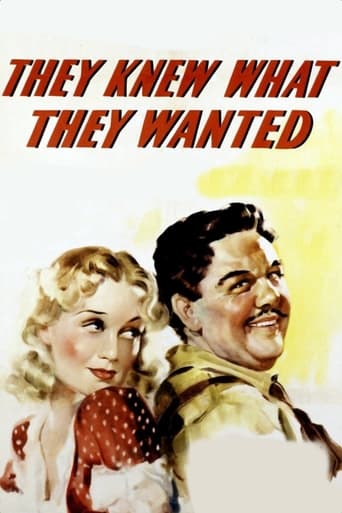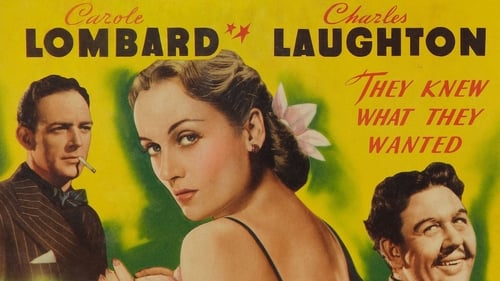bkoganbing
For some reasons all three of the big screen versions of Sidney Howard's Pulitzer Prize winning play They Knew What They Wanted have been unavailable for years. Not seen on television and not out in any form, it certainly was lucky that someone put this out on YouTube. Also unusual in that the only Oscar recognition this film got was William Gargan's nomination for Best Supporting Actor as the Christian role in Sidney Howard's twist on the Cyrano DeBergerac story.Charles Laughton is a lusty Italian immigrant who's got the biggest ranch in the Napa Valley in California and he's the richest guy around. Laughton with his Italian accent gives a Mediterranean flavor to his own Oscar winning role that of Henry VIII. That scene at the feast where he shows off his strength and vitality reminded so much of the wrestling scene in The Private Life Of Henry VIII.But unlike a king who can just command a marriage to his royal person, Laughton for all his wealth and power is not the handsomest fellow around. So when he decides to marry waitress Carole Lombard, Laughton sends a picture of that handsome devil William Gargan who's known to be a devil with all the local women. Lombard is cast against type, she's usually an urban girl of some means. She sees no future just slinging hash and snappy dialog in her hash house job and she accepts the Laughton/Gargan proposal. She even agrees to go through with it after meeting Laughton. But afterward the story takes a different turn as Laughton is injured and in a long convalescence of his 'tibia and fibula' Lombard starts looking at Gargan and Gargan starts looking back.I won't go any further except to say that the ending here is not what Sidney Howard originally wrote. But the Code was in place and Howard having died the year before was in no position to complain. It ruins the film though, but the Code had to be served. Great performances by Laughton and Lombard are wasted. Gargan who usually played all kinds of police roles in and out of uniform was also good in a role that was against type for him as well.Still a chance to see legends Lombard and Laughton together is worth it. They were together in a bad film years earlier when both were under contract to Paramount called White Woman. They Knew What They Wanted is so much better.
slaphappy5000
even taking into account the context of its time, this is incredibly dated, morals-wise. also, it strains credibility that the female protagonist (amy) would stay initially, stay later, stay longer, proclaim her love for (the wrong guy), and then leave w/o getting together w/who she wanted all along. just seems really dopily contrived. "she DIDN'T know what she wanted" would be a more apt title. also, the whole plot revolving about her pregnancy just comes from out of nowhere and dominates the proceedings as if it was 1750 in puritan new england. i really wanted to like this film; i'd heard it was good - - but it's really pretty hard to take. as for tony; he's similarly unbelievable, a 1-dimensional character, until he explodes, and then he becomes 2-dimensional (still 1 short). OK i'm done
RondoHatton
Charles Laughton goes sort of over the top in this little movie. The plot is reminiscent of "Postman Always Rings Twice", i.e. sweet lil' immigrant meets girl & loses girl to employee, but without James M Cain's violence. Laughton's Tony really is a most happy fella, & Lombard is as usual, steamy. Totally by chance, I happened to do a double bill of this and the 1935 Mutiny On The Bounty. I should have added Ruggles Of Red Gap, Hunchback, Hobson's Choice, and Witness For The Prosecution for a total Laughton immersion. This was filmed on location in an incredibly rural Napa Valley, and if you're familiar with Napa Valley, you may recognize what is now the Calistoga Inn/Napa Valley Brewing as Tony's local cantina/bar. I'd like to see a cleaned up version of this, as the print I saw was verrry dark. Good little movie.
Alice Liddel
'They knew what they wanted' fits in very well with Garson Kanin's most famous films, the romantic comedies 'Bachelor Mother' and 'My Favorite Wife': a cynical view of the pieties of marriage, family and friendship; a larger-than-life paterfamilias who must rethink his most complacent assumptions: a spineless male hero who would rather run away from trouble he's caused than face up to it; a plot involving crossed-wires, mistaken identities and performances intended to deceive.It's good to remember the Kanin familiarities, because in many ways this is the above-mentioned films' polar opposite. It is based on a Pulitzer Prize-winning play, which not only means that the dialogue is stilted, the characterisation caricatured and the themes morose, but also means a combination of self-consciously 'heavy' issues (race, promiscuity, adultery, unwanted pregnancies, mail-order marriages - despite gaping plot euphemisms and ellipses) and lachrymose piety, in the noxious person of Padre McKee, an Irish priest whose status in the community is that of a luggage carrier, and yet who insists on sticking his oar in with a mixture of cruel jibes and other-worldly homilies.Tony Patucci is the larger-than-life Italian immigrant who has worked so hard in his new country that he now owns a huge vineyard ranch in Nava County, run by his foreman and trusty friend Joe, a migrant worker who spends his nights hustling women by the quays and is afraid of becoming too attached to his boss. On a vacation to San francisco, Tony catches sight of a life-hardened blonde waitress, Amy, and decides to marry her. He gets joe to write her a letter, and soon a correspondance ensues, resulting in Amy accepting Tony's proposal of marriage. Afraid that she will reject a fat Italian, Tony sends a photo of Joe, and so all the trouble starts. Even after the initial mix-up is cleared up, there is an obvious, though hate-filled, attraction, between Amy and Joe, and on the festive night before the wedding Tony drunkenly falls off his roof in an attempt to impress his new bride, leaving her and his friend wide open to temptation.Tonally, 'They knew' is a strange film, moving as it does from gentle rural comedy to sub-Eugene O'Neill tragedy. It is made with Kanin's customary skill, and he manages to made the material watchable for most of its running time. He skillfully captures the sun-cracked Eden of Tony's ranch, and the intimations of temptation, and it's a rare Hollywood film of the period that shows any kind of ethnic community positively, even if these Italians predictably sing, drink and perform dangerously macho feats.Some people think that 'They Knew' is racist, and that Charles Laughton's performance as Tony is not an intelligent attempt to reveal his character's inner-life, but a self-indulgent collection of stereotypical texts, perhaps on the level of ''Allo 'Allo'. It would be mean-spirited to accuse the film-makers of racism - they are clearly sympathetic to their hero, and presumably think his climactic act of violence does reveal character, rather than being the generic climax for all 'serious' American drama.
Tony is never allowed go beyond being a naive, infantilised, figure of fun - he has no sexuality, he doesn't even seem to truly understand what Amy and Joe have done. This is deliberate - when Tony is on the roof trying to prove his masculinity, he falls, just as the friend he calls his 'son' is making progress with his bride: his act of sacrifice is his way of being a husband and father, without having to become a sexual adult, retaining his Christ-like innocence. We would now call this racist, or at least not thought through hard enough - as an Oedipal drama it lacks true physical weight, although Joe's exit into a dawn wasteland is visually powerful.
But there is a strange scene where Tony is listening to 'Amos and Andy' on the radio: we, the audience, find ourselves watching a media representation of a racist stereotype listening to a media representation of racist steretotypes. Not for the first time in his career, Kanin's prickly intelligence forces us to rethink what we've been watching.




